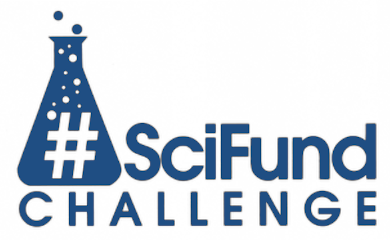https://experiment.com/projects/how-does-communication-training-benefit-scientists
Each day we are going to highlight one of the amazing research projects seeking funding in Round 4 of the #Scifund Challenge. Today we learn about ENGAGE, a project that has similar values to #SciFund, from Jessica Rohde (@RockyRohde).
Tell us about yourself, where you are from, and where you see yourself going.
I’m a former fishery scientist who made a career switch into science communication. I decided that if I wanted my science to truly have an impact and help citizens to make informed decisions, I needed to learn to engage with the public and tell them why my research is important to them. Now I teach a graduate level science communication course at the University of Washington, part of the Engage Program.
I’m from Seattle (go HAWKS!) and I’m lucky to have such a supportive science communication community around me– the Engage Program students and volunteers, University of Washington College of the Environment science communication task force, and my colleagues and friends at Science Online Seattle. They’ve supported me, inspired me, and empowered me to initiate projects that, without them, I might not have believed I could do.
Where am I going? Why, to change the world, of course!
How did you get involved in your research project?
I spearheaded this research because I attended COMPASS’ #GradSciComm workshop, where science communication training leaders put their heads together to figure out how we can integrate communication training into the curriculum of graduate students. Two critical roadblocks to this goal emerged: lack of evaluation of communication training programs’ effectiveness, and lack of support from the advisors of students who wish to take such courses. Our research aims to tackle these two roadblocks by providing a framework for evaluating the effectiveness of our training program and evaluating the benefits of the training program to the careers of students.
Why is your research important to you? Why should others fund it?
“With the knowledge of science we can solve resource limitations, cure diseases, and make society work happily—but only if people can figure out what in the world scientists are talking about and why they should care.” –Randy Olson, Don’t Be Such a Scientist
We’re trying to give science a stronger voice in public discourse and decision making by helping science grad students learn to be better communicators. Although we know intuitively know that being a good communicator makes you a better leader and a better scientist, there are still advisors out there who think communication training isn’t the best use of their students time, that they should be focusing on research instead. We want to quantify the benefits of communication training for scientists to give those students the leverage they need to take communication courses and/or create their own training programs.
Why did you decide to participate in the SciFund Challenge?
I think #SciFund will give us valuable data! In the face of ever-tightening science budgets, we need to know how to make science crowdfunding successful so that more researchers feel empowered to try it. Additionally, the #SciFund challenge provides a sense of community. There are nearly 30 researchers who have entered into this intimidating new frontier together. We support one another and provide feedback on each other’s work. We don’t have to go it alone.
Tell us something random. Something funny. Something borrowed. Something blue.
In class, we practice improve activities to teach students how to respond positively to unexpected situations, like when you get asked a question only vaguely related to your research after you give a presentation. I love this part of class, because I get to be totally silly! It’s a great creative outlet in the otherwise too serious life of a scientist. In this video, we’re playing a game where one person makes a motion and sound for an animal, then they pass it to somebody else, then that person repeats the animal, then makes up their own. Check out my horse impression!
You can find Jessica’s project here.



1 comment on “#Scifund Challenge Round 4 with Jessica Rohde”Add yours →
Comments are closed. You can not add new comments.